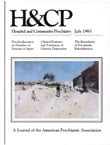The Boundaries of Psychiatric Rehabilitation
Abstract
The authors describe the development of modern psychiatric rehabilitation, from its early association with occupational therapy to its present state as a discipline with an armamentarium of treatment strategies. Psychiatric rehabilitation addresses difficulties in three domains of patients' lives: clinical status, functional status, and quality of life. The authors suggest that the acceptance of rehabilitation as a separate discipline has been slow due to boundary conflicts between these domains and between the disciplines that traditionally represent them. The authors call for a more central role for rehabilitation, which integrates treatment in the three domains and uses group methods to formulate plans and enhance client involvement.
Access content
To read the fulltext, please use one of the options below to sign in or purchase access.- Personal login
- Institutional Login
- Sign in via OpenAthens
- Register for access
-
Please login/register if you wish to pair your device and check access availability.
Not a subscriber?
PsychiatryOnline subscription options offer access to the DSM-5 library, books, journals, CME, and patient resources. This all-in-one virtual library provides psychiatrists and mental health professionals with key resources for diagnosis, treatment, research, and professional development.
Need more help? PsychiatryOnline Customer Service may be reached by emailing [email protected] or by calling 800-368-5777 (in the U.S.) or 703-907-7322 (outside the U.S.).



